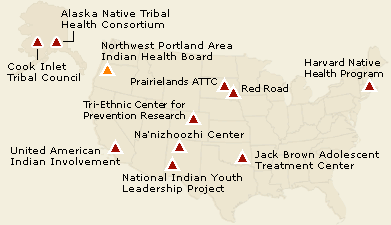These Centers of Excellence are key partners, both as sources of evidence-based practice and as disseminators of evidence-based practice.
The Center’s reach is extended by consultants and partners located throughout the country. The Programs shown on the map below work with One Sky Center to develop resources.

Alaskan Tribal Health Consortium: (Jim Berner, Director of Community Health Services)
ANTHC is a non-profit health organization, owned and controlled by Alaska Tribal governments and their regional health organizations, to provide comprehensive statewide Native health services and training.
The Consortium addresses an extreme rural healthcare challenge with village health aides who are chosen by their village. The aides receive 20 weeks of training and a preceptorship. The training program is available in manual form and core competencies are measurable. They now have a federal curriculum and certification and can get medical reimbursement for health aides’ services in Alaska.
The Consortium is also initiating a dental healthcare aid program and putting together a program for behavioral health aides to serve in this area. The Consortium is seeking a behavioral health aide module, based on the dental template. They are considering the CSAT set of Addiction Counseling Competencies (ACCs), though they need more mental health representation before finalizing a framework for training and standard-setting for village behavioral health aides.
OSC collaborates with ANTHC by offering technical assistance for program development, consultation and workshop facilitation. The Behavioral Health Aide program has the potential to reduce disparities in treatment and prevention opportunities in isolated rural areas. We plan to take the knowledge/practice resource to the next level with a dissemination program.
Jack Brown Regional Treatment Center: (Mike Fisher, Director)
The Center is a state-of-the-art inpatient, dual diagnosis, culturally appropriate treatment program whose catchment area is principally Kansas, Oklahoma, and Texas. It is run by the Cherokee Nation, located on the campus of Sequoyah High School at Tahlequah, Oklahoma, and has a 25-bed capacity. It has served more than 1,000 clients and seen a change in adolescent drug of choice from primarily alcohol in 1991 to marijuana in the late 1990’s and now to methamphetamine.
A comprehensive, self-contained program of education, counseling, recreation, psychology and cultural enrichment is used to treat the client, with a special emphasis on art therapy as a means of health promotion.
Jack Brown Center is accredited by the Commission on Accreditation of Rehabilitation Facilities, (CARF). CARF is working to incorporate culturally competent assessors in an effort to ensure that culture gets incorporated and assessed appropriately. It is also a potential mechanism to document appropriate standards and, thereby, get services recognized and reimbursed by Medicaid.
Jack Brown Treatment Center and One Sky Center collaborate to provide technical assistance and consultation to develop post-discharge follow up and aftercare for adolescent clients and assess resource needs of all Youth Residential Treatment Centers.
National Indian Youth Leadership Project: (McClellan Hall, Director)
The central theory underlying this program is learning through experiencing (as compared with instruction, stories, etc). The experiences are based on advice from the Elders on how to operationalize traditional cultural values and role behaviors. Community service, adoption of meaningful roles, and leadership are learned through the experiences provided.
Over the past 20 years, the Leadership Program mission has been positive youth development. The program is somewhat similar to Outward Bound in that the setting is outdoors and challenging the client is part of the technique. Project “Venture” has been replicated 26 times with funding by the State of New Mexico, and evidence of efficacy has been gathered. In addition to the replications, there are two adaptations of the program: a program for girls and a program focused on healthy relationships and choices.
Mr. Hall works to make the distinction between key principles of the program that cannot be altered without jeopardizing effectiveness, and minute details that can easily be adapted depending upon the needs and culture of the local setting. A key principle of the adaptation is a focus on where the client wants to be and what they can do to get there (defocusing the negatives).
Their role with One Sky Center is to provide consultation, training and technical assistance to other organizations that want to implement leadership programs.
United American Indian Involvement: (Daniel Dickerson, DO, Clinical Director)
UAI, located in Los Angeles, works with urban populations and adopted a Circles of Care model, a case management model of service delivery that includes home visits. It is funded by many agencies to deliver seven programs: public health, primary and specialty care, cultural case management, health education, family wellness, child and family counseling, healing from domestic violence and sexual assault, clubhouse, workforce development, research, and system of care planning. They also offer an after school program for youth 5 -18 and summer youth camps for 150 kids per year. They use other sites for service delivery; transport clients to corporation sites for cultural activities; cultural competency training for agency staff; youth camps; internship for psychologists; and culturally sensitive screening. They also offer cultural competency training to subcontractors. Several of their activities (e.g., training programs) are compiled in manuals.
Their role with One Sky Center is to provide technical assistance and consultation to other urban programs.


